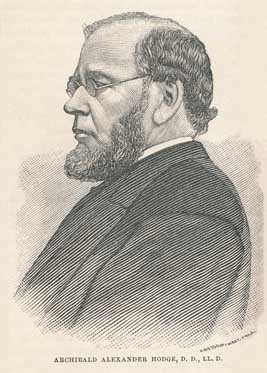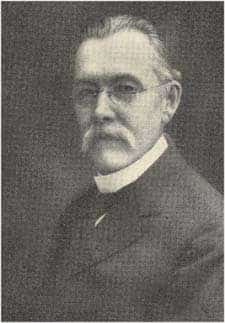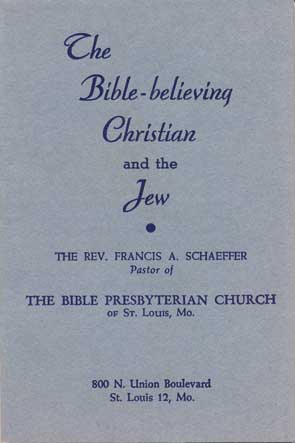Bit of a “think piece” for us here on this Saturday morning. Browsing through an old periodical, I came across the following testimony by Archibald Alexander Hodge, son of Charles Hodge. I’m not sure if this testimony found its way into some other publication by A.A. Hodge, or otherwise where it came from. Perhaps some alert reader can let us know.
PERSONAL REASONS FOR BELIEVING CHRISTIANITY TO BE A REVELATION.
 By Prof. A. A. Hodge, D.D., Theological Seminary, Princeton, N. J.
By Prof. A. A. Hodge, D.D., Theological Seminary, Princeton, N. J.
To the question, “Why do I personally believe Christianity to be a Revelation?” I would say:
1. I recognize the obvious fact that my rational and moral intuitions, and the information they afford, are as valid as my sense perceptions and the discoveries they make of the material world. Personality, freedom, moral responsibility—the eternal, ultimate, universal, and supreme obligation of the Right, are to me the first and most sure of realities.
2. The light of my own personality, will, intelligence, and conscience, cast upon external nature, and upon the human society which surrounds me, reveals God. He is manifested in the exercise of my own consciousness, and in the phenomena of external nature, as the invisible spirits of our fellow-men are visible in their persons and actions; and I spontaneously recognize Him as certainly as I recognize them. Intelligence, choice, and, therefore, personality, are everywhere visible in the successions of external nature; and the presence of a presiding moral personality is witnessed to by the sense of responsibility and of guilt never absent from my own consciousness. To the extent to which science renders nature intelligible is the latter proved to be the product of an ever-present and acting intelligence. This God is discerned to be immanent in the external and internal world, as distributed through space and time, just as clearly as the phenomena themselves through the medium of which He is manifested. At the same time, He is just as clearly and as certainly discerned as a moral and providential Governor objective to ourselves, transcending all phenomena, and speaking to us, and acting upon us from without.
3. As thus revealed, it is evident that this God has created me in His own image. Instincts, also, which cannot be denied, testify that He is my Father. As a child of God, unassuagable instinct cries for union with Him. As a subject of His moral government, I know myself to be justly exposed to His wrath because of sin, and that I must have a Mediator to make my peace, else I die. His treatment of the race historically, and of me personally, affords strong presumption that He will sometime reveal Himself to me, and redeem me from the ruin effected by my sin.
4. I was born in a Christian family, and in a Christian Church. Parents and friends lived before me from the beginning lives which, in strong contrast with the character of the surrounding community, were unmistakably supernatural. Through the subsequent years, I have seen innumerable individuals of many nationalities whose lives and deaths, in spite of all inconsistencies, possessed the same supernatural character. All these referred the mystery of their lives to the facts of an Incarnation of God eighteen hundred years ago, and to the subsequent indwelling of a Divine Person in their hearts. The history of this stupendous event, and the promise of this indwelling, I found recorded in a Book, itself giving, whenever and wherever believingly received, equal evidence of supernatural origin and power.
5. The Bible and the Church thus present me with Christ. I find His person, life, words, death, and resurrection, and the consequence thereof, to be, when accepted as intended by the evangelists, the key which gives unity to all history, or, on the contrary, when not so understood, an infinite anomaly, neither to be reasoned away, nor explained. The very God immanent in nature und in conscience is revealed in this Christ with a satisfying completeness, solving all problems, and satisfying all needs—expiating human guilt, sanctifying human life, reconciling the Moral Governor to His sinful subject, and uniting the Heavenly Father to His child.
6. This objective revelation of Christ in the Bible and in the Church, once accepted as genuine many years ago, has ever since been developed and strengthened in my consciousness, by a religious experience, which, however imperfect, has proved continuous, progressive, and practically real, to this day—a power in my life as well as a light in my sky.
7. This confidence grows more entirely satisfying through every renewed examination I am able to make of the historical monuments by which the fundamental facts of Christianity are certified. The authenticity of the records, the definite certainty of the facts, the miracles wrought, and the prophecies fulfilled, are among the best established events in history. If these be denied, there will be nothing left of which we can be sure. The supernatural birth, life, death, and resurrection of the God-man, and the miraculous growth of the early Church are all to me certainties, implicated in all rational views of the past or present state of mankind.
8. This is corroborated by all I have learned, as for years the pupil of Joseph Henry, of the genuine results and tendencies of modern science. Instead of stumbling at special and transient collisions, I have seen it to be true, as in all other healthy, open-eyed vision, that the worlds of matter and spirit, and the revolutions of Scripture and science gloriously supplement and interpret each other. As the body is organized to the uses of the spirit, and the shrine to its resident divinity, so science is evermore unveiling the Temple which none other than the Triune God of Christianity can fill with His presence and crown with His glory.
9. The conviction of the truth of Christianity is greatly confirmed by the violent contrasts afforded by all other religions, by the miserable failures the best of them achieve; in their historical records; in their representations of God, of nature, and of man; in their provisions for the needs of the human reason, conscience, or affection; in the relation of their cosmogonies to the results of modern science; and in their influence upon human character and life, individual and collective.
10. Finally, my satisfaction with Christianity is consummated by the sorry plight presented by all the various parties who deny its truth, or rebel from its authority. Uncertain, inconsistent, inharmonious, instable, unfruitful, they take refuge in negations, and nowhere dare confront Christianity with positive, coherent counterpositions of creed, of evidence, or of practical results.—Ex.
[excerpted from The Pulpit Treasury, vol. 3, no. 8 (October 1885): 371-373.]
 The new orthodox seminary, Westminster, had only been open for two weeks on October 11, 1930, when one of the premier faculty members of that theological institution, and before that, Princeton Theological Seminary, Dr. Robert Dick Wilson, died suddenly. He had been blessed with excellent health most of his teaching career. But after a brief week of illness, he went into the presence of the Lord.
The new orthodox seminary, Westminster, had only been open for two weeks on October 11, 1930, when one of the premier faculty members of that theological institution, and before that, Princeton Theological Seminary, Dr. Robert Dick Wilson, died suddenly. He had been blessed with excellent health most of his teaching career. But after a brief week of illness, he went into the presence of the Lord.

